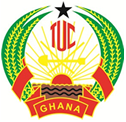
The Trades Union Congress (TUC) was launched in 1945, twelve years before Ghana gained political independence. At the time of its formation, the TUC had a total of 14 unions with a numerical strength of 6030. The TUC had its headquarters in Sekondi in the Western region (Ibid, 2007). C.W. Techie-Menson and Manfred Gaisie became the first President and General Secretary of the Gold Coast TUC respectively. The TUC could not register with the Labour Department because the Trade Union Ordinance (CAP 91) did not have provisions for a federation of trade unions. The TUC was, however, recognised by the government as a mouthpiece of trade unions in the Gold Coast.
Unionism continued to gain popularity after the TUC was formed. By March 1947, the number of TUC affiliates had increased from 14 to 27 unions and the paid-up membership had increased from 6,030 to 10,976. The number of trade unions increased rapidly to 95 in 1957. Table 4 shows the number of unions and their membership from 1945 to 1957. In 1947, the TUC constituted district councils of labour made up of both registered and unregistered trade unions. District councils of labour discussed issues of national and international interest including minimum wage, housing, health, and education.
In 1952, a group of unemployed persons in the Sekondi and its environs formed the Ghana Trades Union Congress as the second labour federation. These two federations merged under the name the Gold Coast Trade Union Congress (TUC) in 1953 and in the same year the headquarters of the TUC was transferred from the office of the Railway Workers’ Union in Sekondi to Accra. In 1954, the TUC underwent restructuring and reduced its affiliates to 16 industrial/national unions under a new constitution. By the time of independence in 1957 TUC had 95 affiliated unions with total membership of 58,000.
TUC secured a legal existence following the promulgation of the Industrial Relations Act of 1958, which recognised it as the sole national trade union centre representing workers of Ghana. The 1965 Industrial Act (Act 299), which emerged as the main framework for industrial relations in Ghana –until 2003- also recognised the TUC as the representative of workers but left some room for the emergence of other trade union centres. In the period prior to the mid-1980s to the early 1990s, the overall numbers making up the total membership of the TUC-Ghana rose in official figures to about 600,000. The numbers have since declined to about 500,000 largely as a result of heavy job cuts in the public sector where trade unions have traditionally drawn their membership. Dues paying membership however stands at 350,000.
At the international level TUC-Ghana is a member of the International Trade Union Confederation (ITUC) and is active in the regional organisation of ITUC-AFRICA. The TUC is also a member of OATUU as well as the Organisation of Trade Unions of West Africa (OTUWA). The organisation also maintains bilateral relations with a number of trade unions in Africa, particularly, with the National Labour Congress (NLC) of Nigeria and Congress of South African Trade Unions (COSATU) of South Africa. The TUC also has strong relations with trade union driven solidarity support from Europe, namely FNV Mondiaal of the Netherlands, SASK of Finland, LO-FTF of Denmark and FES of Germany as well as others in America and Asia.
The member unions of the TUC are also active in Global Union Federations including Public Services International (PSI), International Transport Federation (ITF), Union Network International (UNI), Education International (EI), International Federation of Chemical, Energy, Mine and General Workers’ Unions (ICEM) and Building and Woodworkers’ International (BWI).
The mission of the TUC is “To unite all workers of Ghana into an independent and democratic organisation for improved working and living conditions through collective action, solidarity and social partnership based on the principle of fairness and justice.”
The vision of the organisation is “To be among the best labour organisations in Africa”
